Summary
Introductory EA Fellowships are the default way that EA university groups introduce new members to EA concepts. These ~8-week-long discussion groups have some virtues: they’re scalable, high fidelity, accessible, and not that weird looking. But only 2-10% of students who start an intro fellowship end up engaging with EA afterwards; it feels like we can do better.
I ran a 4-day retreat to get new people to the same level of EA knowledge as an intro fellowship would, inspired by the ideas in We Need Alternatives to Intro Fellowships and University Groups Should Run More Retreats. I had 8 fellows, 5 of whom were on the intro track and 3 of whom were on the in-depth track, plus 4 facilitators/organizers, and 4 professionals who came up for one day.
With n=1, it’s hard to draw concrete conclusions, so I’m not intending to sell people on retreats vs. fellowships. Rather, I hope this post helps other group organizers generate ideas about alternatives to intro fellowship, and makes it easy to iterate and improve upon what I did.
Retreats vs. Intro Fellowships
Advantages of Retreats
Here are the main points in favor of retreats, which my experience running this event corroborates:
- Manic retreat magic:
- In Trevor’s words: “Retreats encourage the kind of sustained reflection, one-on-one conversations, and social network construction that actually get people to reevaluate their plans. Most other EA programming occurs in classroom-type settings where people are used to engaging with ideas intellectually but not taking them seriously as action-relevant, life-affecting things.”
- Or, in Duncan Sabien’s terms, retreats make people’s minds muddier—more flexible, open to new ideas.
- The flip side of intro fellowships being “accessible” or “not weird” is that there is no manic magic—instead, people show up, have intellectual debates often in a literal classroom setting, and never seem to realize how life-changing all those ideas would be if they really took them seriously.
- Faster/more interesting for fellows: this is a key point of Ashley’s post and is supported by ~2/10 of my closest engaged EA friends saying they would have never signed up for/made it through an intro fellowship, and wouldn’t have gotten into EA if that was the on-ramp presented to them. Worse, it seems that the most curious/driven/agentic people are most likely to feel this way. Retreats are less likely to lose that demographic.
- Social bonding: People are way more likely to feel drawn to engage with EA more if they have friends there, feel a sense of community there, and doing so lets them talk to people that they like. EA can also be intimidating—probably particularly for minority demographics in EA—so feeling comfortable reaching out/asking “dumb” questions to more highly engaged members of the group seems important. Retreats leave more time for socializing in general, in particular for late night mushy/emotional conversations, and have people together at more vulnerable/less put together times (sleeping in the same rooms, hanging out in PJs, eating all meals together). I felt far closer to these intro fellows after the retreat than I have ever felt to a typical cohort.
- Faster path to doing impactful things: getting people on board in 4 days instead of 8 weeks adds 52 days to their more impactful career.
One notable thing I did with this retreat was to mix intro fellows with in-depth fellows, university EA organizers, and EA professionals. The advantages of this were:
- Less Dunning-Krueger effect: it’s common for people after the intro fellowship to feel like they understand EA pretty extensively, and having a bunch of in-depth people there shows them what’s coming next/how much engagement these questions demand.
- Not relying on one facilitator as the source of truth on EA or as a prototypical EA.
- Makes EA feel less like “just a college club” and more like a thing that adults seriously apply to the biggest decisions of their lives.
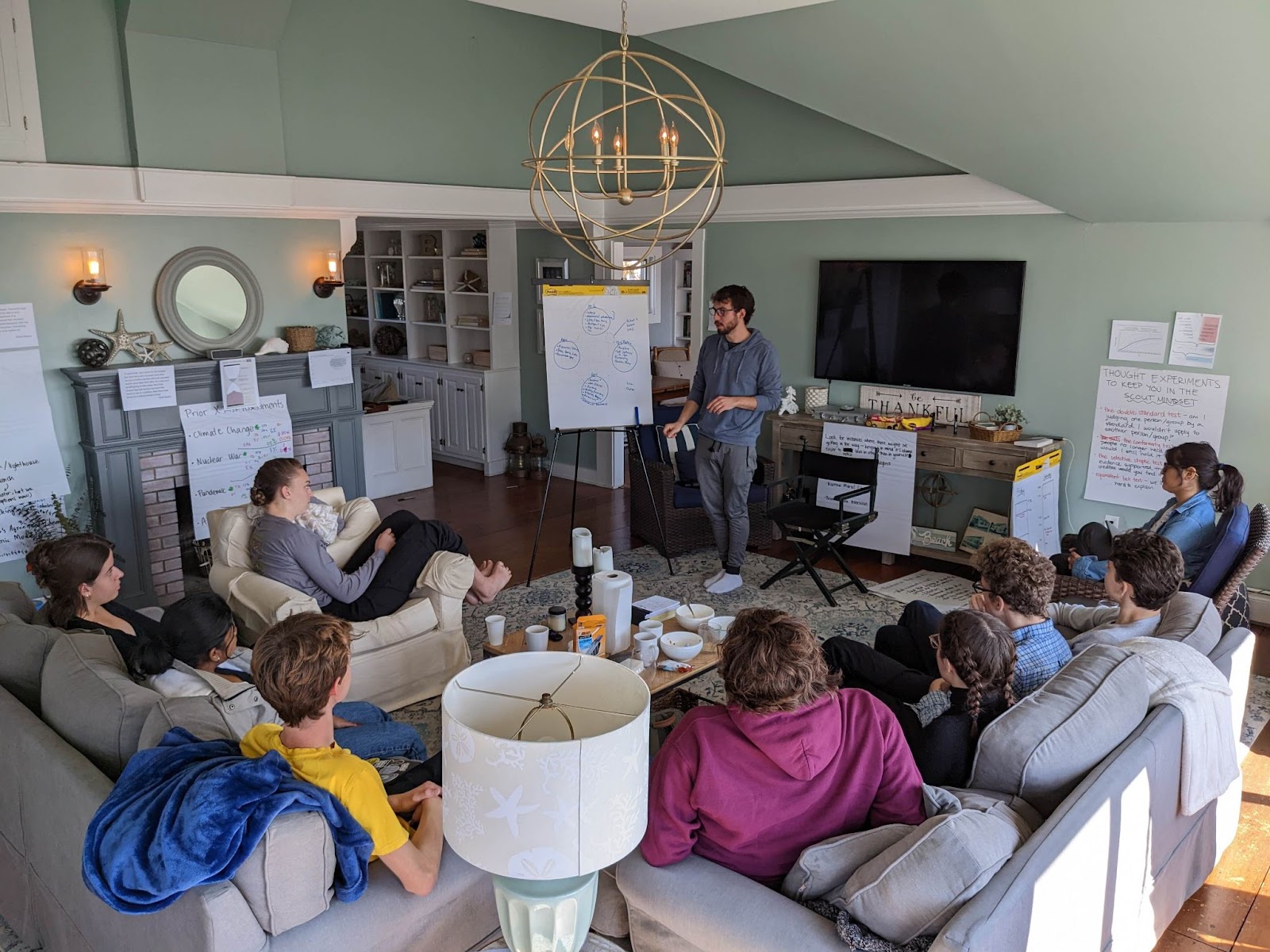
Disadvantages of Retreats
However, there are some reasons retreats might be worse than intro fellowships:
- Higher time cost: I’d very roughly estimate that it’s about 1.7x the total organizer/professional time cost of an intro fellowship per intro fellow. Back of the envelope calculation goes something like:
- For 12 people at a retreat (because having full intended attendance would have added no time): 30 hours of in-advance ops work for me (not including planning programming, which will get cheaper every time) + 60 hours of professional guest time + 140 hours of organizer time at the event.
- For 12 people in an intro fellowship: ~20 hours (???) of backend ops + 72 hours of organizer time for 3 cohorts of 4 to meet each week for 8 weeks.
- Then adjusting multiplier down because: organizers benefitted from sense of community/meeting professionals + the counterfactual isn’t that they spend those 36 hours doing EA things + intro fellows should be meeting those professionals anyway, only by default it might happen at other club events…so I think overall the extra time sink is more like 1.7x instead of 2.5x of an intro fellowship.
- Higher monetary cost: about $9k for the 8 fellows (though I think it could have been done for $11k and 12-14 fellows, given that the airbnb was just underfilled) vs. an intro fellowship which would be ~$1800 for 12-14 fellows for books and meals at meetings + a couple of socials.
- Less material covered: I didn’t have people do reading in advance, though as we’ll get to later, I’m uncertain about this choice. I feel like we got all the very key points across and they got more conversations with highly engaged EAs where they saw EA reasoning put into practice, such that at the end they’d absorbed the key stuff just as well (if not better), but perhaps I’m underestimating how hard it is to absorb because it’s been in my head for so long now.
- It’s harder to get people to come (see outreach section). I think this also had the upside that the people who did come are more interested and so the quality of conversations felt higher.
- Optics: some people were concerned about the cost. I actually picked one of the cheapest airbnbs that could fit everyone, but looked fancy, and we went to Maine which seemed unnecessary + expensive. In my opinion, going to a beautiful place in Maine in fact provided a lot of value and would be easily worth it if not for optics, but alas, optics matter. May also seem culty or pattern match to religion.
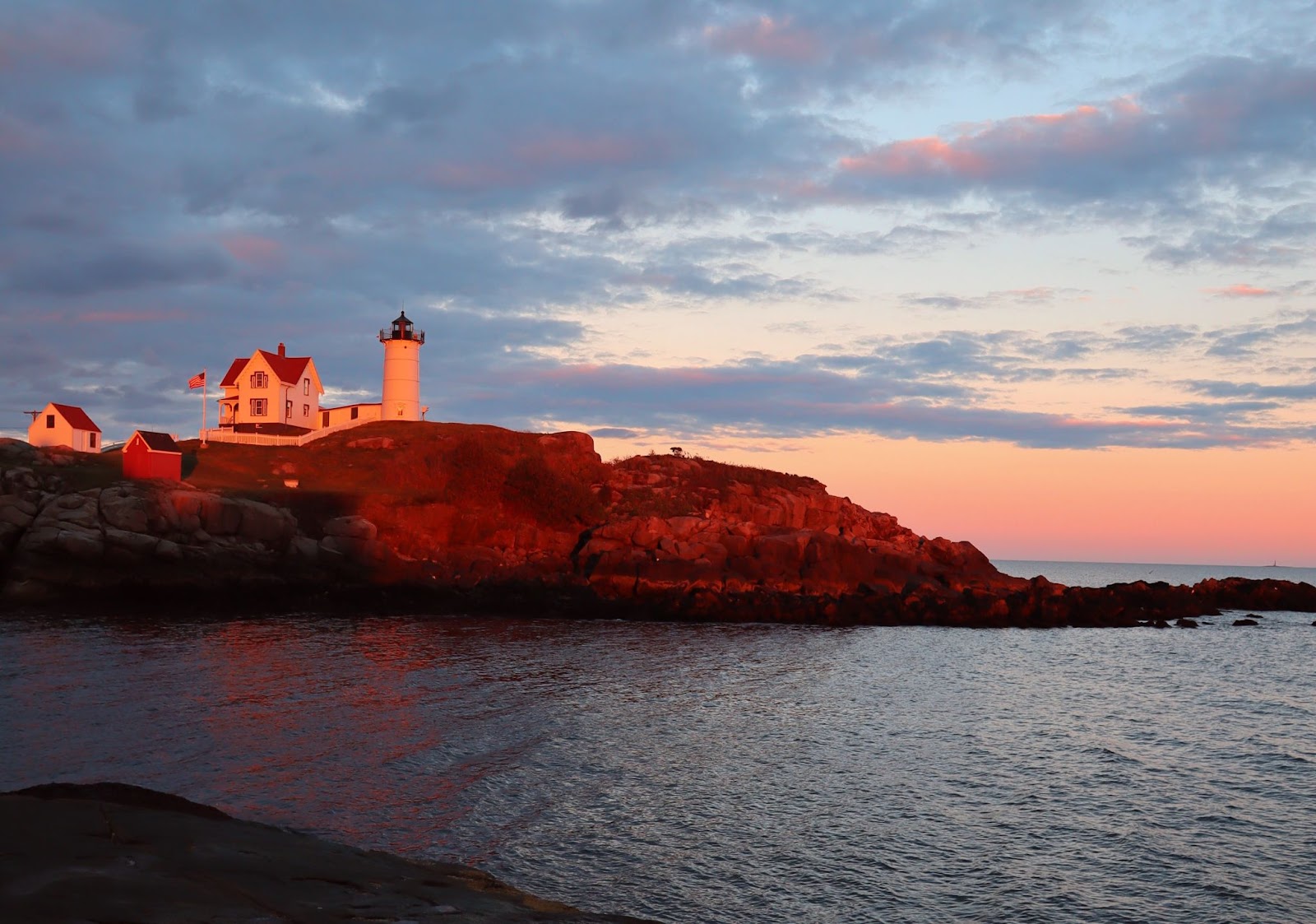
Thoughts on Outreach
- It’s much harder to get signups for Intro Retreats than Intro Fellowships. In order to get signups, you need to do more reaching out 1-1, and just more outreach period.
- Above said, I do not recommend doing broad outreach for a retreat—don’t put it on posters/mailing lists. Why?
- Weird optics? Retreats may seem extravagant.
- Without permission from the school, your club may not be allowed to host an event like this, and because of the other downsides in this list, it’s not worth the risk of getting in trouble. I know uni group organizers have a general preference for blissful ignorance of student organization regulations, but this seems like a high risk/low payoff thing to advertise.
- Attendees should have more EA knowledge before committing to a retreat than to an intro fellowship. Unlike in an intro fellowship, if someone comes and a couple sessions in decides that EA isn’t for them, they’re basically forced to stick around and have a bad time, which makes other attendees’ experiences worse and makes them more likely to go off and be EA detractors. In other words, it’s more important that retreat attendees know what they’re getting themselves into than that intro fellows do.
- It doesn’t get many signups anyway. My experience was that reaching out 1-1 was more effective than slightly broader outreach (like announcing at club meetings, sending to our mailing list/slack, etc.) relative to intro fellowship outreach.
- In general with retreats, expect high dropout rates, especially if you had a low barrier to entry in the first place. Aim for 25-50% more RSVPs than you could possibly fit into your space. Dropout rates are inversely correlated with the size of your barrier to entry—expect lots of drop outs if signing up is easy and fewer if people had to apply or were personally/exclusively invited. If it’s a local thing, most drop outs will happen in the 3 days just before the event.
- Prestige & exclusivity leads to more signups: This might be obvious but I neglected this for a while and it made a huge difference. This is accomplished by clean emails, a pretty web/notion page, inviting professionals and advertising that, and reaching out to people individually in a way that makes them feel special.
Event Overview
If you’re interested in running an event like this yourself, see the appendix for details on programming and outreach.
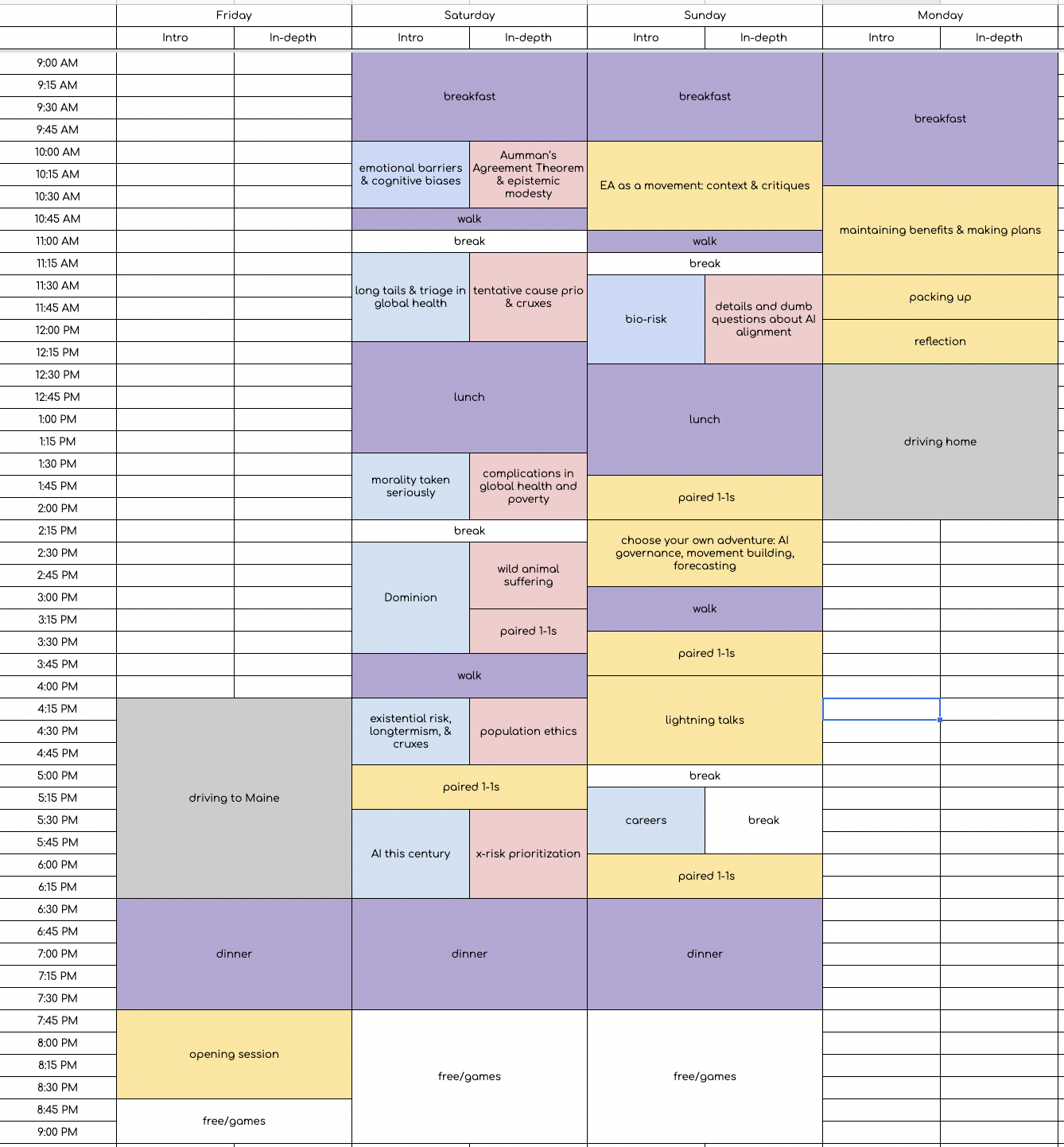
The arc of the event went like…
- Day 1: Got settled, got acquainted, set expectations for the weekend.
- Day 2: Speed-ran all the fundamental content. The intro fellows covered cognitive biases, global health, triage, long tails, ethics, animal welfare, existential risk, longtermism, and AI-risk.
- Day 3: Learned about EA in the real world. We started the day by zooming out to the EA landscape and discussing critiques of the movement, before diving into specific corners of EA through 1-1s, lightning talks, and professional talks. Ended the day with a career workshop.
- Day 4: Reflected on the weekend and made actionable plans.
Only about half of our waking hours were spent on content though. The rest of the time we spent cooking and eating meals together, walking to the beach and to the lighthouse, playing board games, doing structured bonding activities like Askhole and Hamming Circles, and just hanging out.
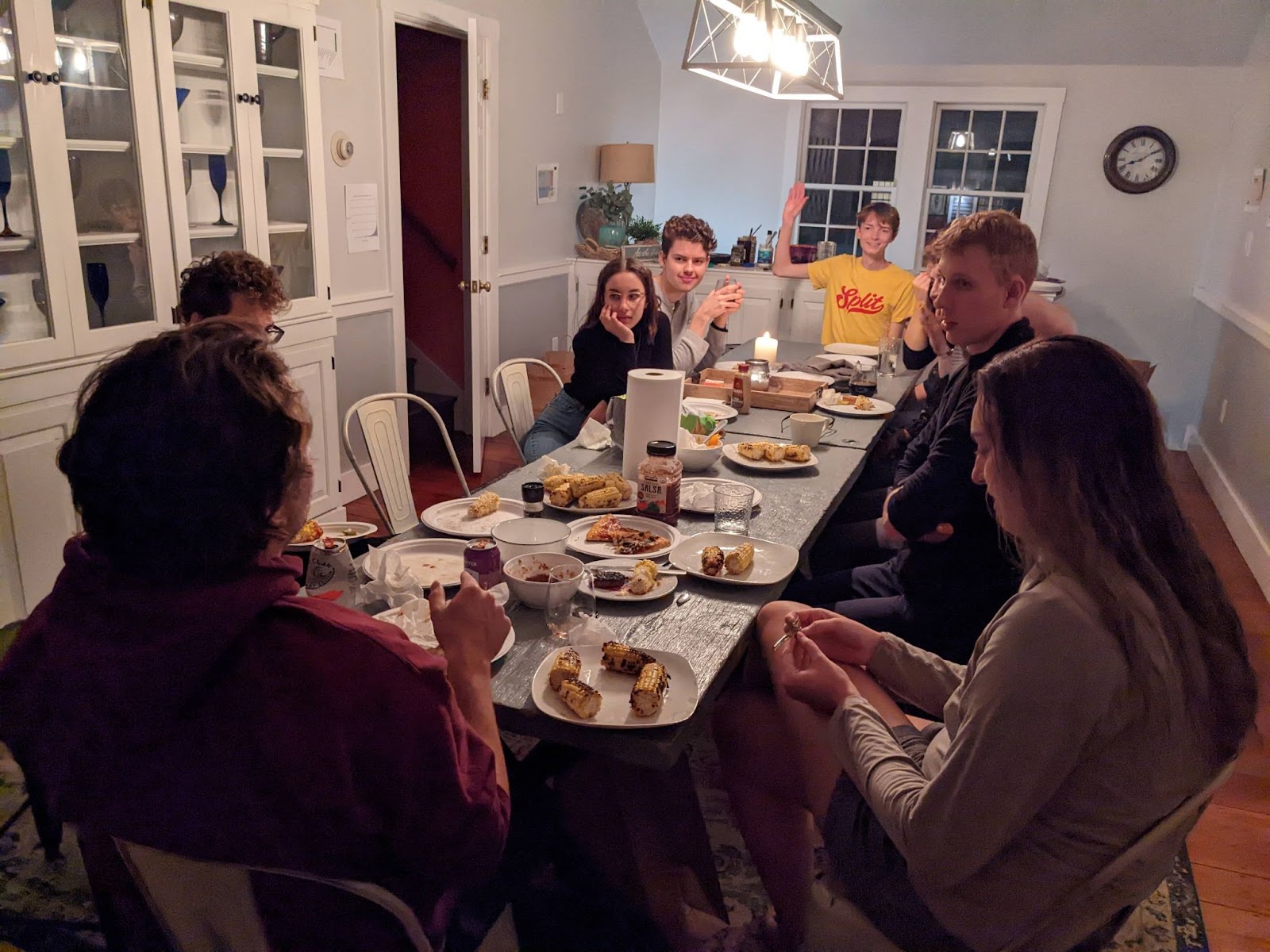
Results
The data from the post-retreat feedback form looks similar to the numbers from typical intro fellowships. This was surprising to me, since people seemed more excited/engaged than any intro fellowship cohort I’ve seen, and I felt much closer to the attendees than I ever had to intro fellows. We have also had higher rates of sustained engagement after the retreat than we do after intro fellows (2 immediately joined the in-depth fellowship, 1 is going to a more advanced retreat this weekend, and 1 of the others have participated in our events since the retreat). There are also strong selection effects on retreat attendees vs. intro fellows (see outreach section in appendix) which makes analyzing this all the more confusing.
Some cherry-picked quotes from attendees:
- “I really liked the weekend retreat idea. I think it was good to step out from the day to day of school life and be in a different setting to engage with big picture ideas.”
- “The group of students and leaders was great, and the sessions we had were very informative about the specific things I wanted to learn. The conversations we would get into after were also very fun and interesting, and the fact that there were outdoor destinations around the house was perfect for one-on-one walks. I think the closing session will have an impact on my life.”
For anonymized feedback results, see here.
Conclusion & Ideas for Next Time
Overall, I remain agnostic about the value of retreats vs. intro fellowships. I’d be excited about hybrid things that combine the benefits of each, like hosting a retreat at the beginning or end of an intro fellowship, or doing 4 weeks of reading/discussion and then a retreat. I mostly want EA organizers to experiment more so we as a community can make sure that the standard EA intro program is closer to optimal.
I’m likely going to run another version of this retreat in the winter for Boston Area students, and next time I will do the following differently (in order of importance/confidence):
- Market from the beginning the way I did at the end: polished + featuring professionals + exclusive + open to more schools.
- Aim to get more people (12-14): obviously I was trying to do this before, but it seems doable with the above point. This will make it more time/money efficient and provide more data.
- Redo most of the in-depth content: I did this last minute and it was not very well thought out. In-depth people I still think got a lot of benefit, but it came more from 1-1s and less from content. I do think what in-depth people might actually get the most from is more independent looking into cause prio/cruxes/careers, and programming can be made for this that takes advantage of the retreat format over the regular in-depth fellowship.
- Let people choose their own 1-1s sometimes.
- Have students help more: especially for EA events run by college students for college students, being a little less polished is okay, and having people help more (put on their sheets, clean in the morning, cook, etc.) makes them more bought into the event, is good for bonding, good for vibes, and of course, saves organizer effort.
- Remember to defrost the Beyond Burgers…
- Make people read in advance? This was my original plan, and it was actually suggested by two people in our final feedback form, but it was hard enough to get people to sign up even without that barrier, so I’m unsure.
- Make the thing shorter? I’m very uncertain about this. It’s hard to get all of the content in as is, and the extra day does lead to more immersion/bonding, but this was also suggested by one person in the feedback form.
Appendix: Programming & Outreach
Read this section iff you want to run an event like this.
How I (Haphazardly) Did Outreach
Originally, this was supposed to be a Tufts-only event. We had a universal intro program application, where students checked boxes for the programs they were interested in and stated preferences among the Intro Fellowship, the Precipice Reading Group, and the Intro Summit (as it was then called). Broad outreach focused on the former two, while our mailing list/website/announcements at the GIM and weekly meetings gave details on all three, and in meetings I emphasized the advantages of the retreat over the intro fellowship. This did not work: of the 21 people who filled out the general application, only 4 expressed interest in the retreat, and 2 had it as their first choice.
Then, about a week and a half before the event, I made a pretty notion page, started calling it the “Global Priorities Summit,” and got a couple professionals to agree to come and reached out to people I’d spoken to who seemed to be some combination of careful thinkers/reasoners and excited about EA to individually invite them. Those invites had a ~50% hit rate.
I also reached out to other group organizers in the Boston area and got 3 signups this way, though 2 dropped out last minute. I think this could have been more successful had I done it earlier, made it easier for organizers to invite people by writing blurbs for different contexts, and bugged them more to actually do it.
All of the above is for intro fellows; I got my in-depth fellows entirely through 1-1 invites. Sample was small and I didn’t put much thought into this so I don’t have much to say here.
In conclusion, outreach for this was hard, but could have been successful had I gotten my shit together earlier or had anticipated just how hard it would be.
How I Planned Programming
I spent more time planning the programming in advance than I did doing all other in-advance ops things combined, and I think I made lots of good choices (and some bad ones).
I planned my programming by first reading Duncan Sabien’s How to: A Workshop (or Anything), then doing lots of brainstorming, guided by a combination of my list key ideas from the intro fellowship that alums must understand, my list of crazy EA things that stick in people’s heads and make them take actions (“holy shit [insert: x-risk/super long tails/factory farming moral catastrophe/drowning child framing]”), and sessions from other retreats that I’ve found particularly valuable. Then I trimmed/combined/ordered sessions, and added in time for breaks, walks, and 1-1s based on how much these happen at other retreats.
I ordered things guided by the principle that the most memorable/important parts of the event are:
- Beginning: set purpose/expectations, be organized/welcoming and give people a good first impression that they remember.
- Climax: the 11th hour, usually the last night of the retreat, people are feeling peak levels of the magical retreat mania, are most open to new ideas.
- End: clear plans, good vibes. What do you want to stick in people’s heads?
Sessions
Here’s the whole weekend schedule—blue means intro, red means in-depth, yellow means combined, and everything else is not learning time. Below are descriptions of every session, with stars next to all the ones that don’t clearly correspond to any week in the intro fellowship/may not be obvious to include, but that I’m very glad I did include.
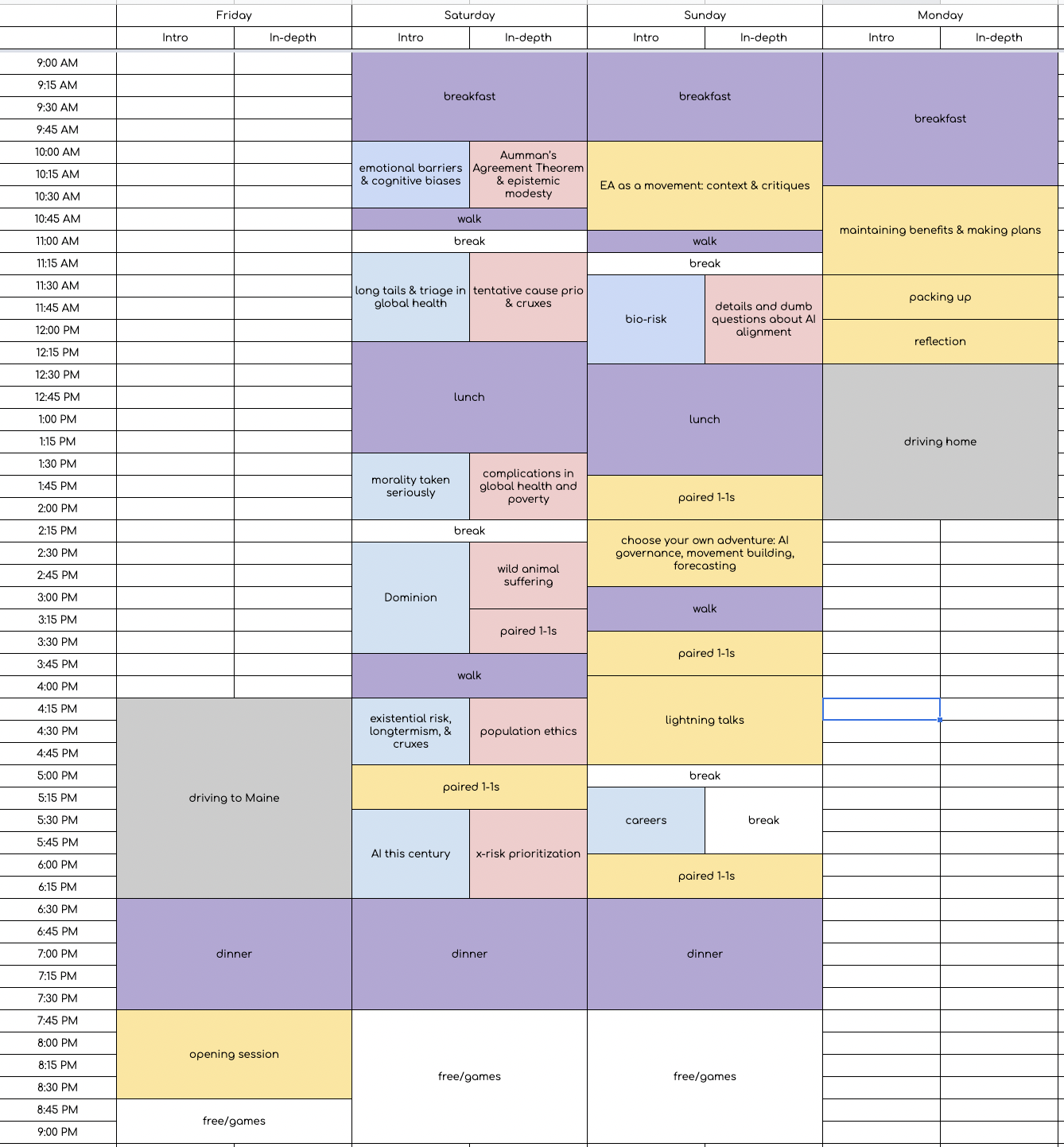
Opening Session*: Got people comfortable/introduced, set purpose/expectations, and gave some advice to get the most out of it. Mostly pulled from Duncan’s How to: A Workshop (or Anything).
Emotional barriers and cognitive biases*: Went over biases in Psychological Obstacles to Doing Good (Better) and talked about motivated reasoning/scout mindset. We spent ~10 minutes on each bias and discussed why our minds work this way, how it can get in the way of doing good, and strategies to combat the bias.
Aumann’s Agreement Theorem & epistemic modesty: Went over the things in the title + intro Bayesian reasoning. I don’t have strong takes about what’s the most important thing to go here, but I think starting both tracks with some sort of rationality/how to think thing sets a good tone for the rest of the weekend.
Long tails & triage in global health: Had fellows read Toby Ord’s The Moral Imperative Towards Cost-Effectiveness in Global Health, discussed how the same concepts—long tails and triage—apply to doing good beyond global health, and how this motivates effective altruism.
Tentative cause prio and cruxes: Explained what a crux is, had people reflect on their tentative cause prioritization and what empirical/philosophical changes could shift their prioritization.
Morality taken seriously*: Explained drowning child thought experiment and had fellows reflect on their values and what it would mean to take them seriously. Included discussion on “moral realms,” i.e. by default people tend to think of personal relationships or politics as places where morality is relevant, while they think of careers as personal choices that have little to do with morality, but this doesn’t make any sense impact-wise. People found that particularly interesting/moving.
Complications in GH&P: Memo session on Growth and the Case Against Randomista Development.
Dominion: Made Singer’s case against speciesism and discussed philosophical motivation for caring about animal suffering, then watched ~30 mins of Dominion (just the pig, egg, and fish sections, and we made this optional and gave lots of warnings), and then discussed reactions/feelings about the documentary, and ended on effective interventions to help farmed animals.
Wild animal suffering: briefly made the case that there’s a lot of suffering in the wild and that humans ought to do something about it, and let participants poke at the empirical & philosophical claims and discuss.
Existential risk, longtermism, and cruxes: defined existential risk & longtermism, emphasizing that concern for the former doesn’t require belief in the latter, and then had people give their estimated for x-catastrophe this century from climate change, nuclear war, pandemics, and AI.
Population ethics: Went through the forced bullet-biting/cornering ritual where we present the total view (looks bad), then average (looks worse), then person-affecting views (maybe looks worse), let people try to articulate their intuitions and develop a system that works with them, and see why it’s impossible.
AI this century: explained AI is coming soon; It will be a very big deal; Could be bad.
X-risk prioritization: had people state what they thought was the biggest existential risk this century and get into small groups with people who disagreed to dig into why.
EA as a movement: context* & critiques: First half was a memo session for Unsurprising things that surprised me about EA, and second half we had people reflect on their biggest critiques of EA (whether of a particular idea or fundamentals, vibes or very well-defined), and pair up vertically to discuss.
Bio-risk: Simon Grimm (professional) from the NAO gave a talk about bioweapons/biosecurity.
Details and dumb questions about AI Alignment: Stephen Casper (professional) talked about the AI safety landscape and paths to skilling up.
Forecasting: Austin Chen (professional) from Manifold talked about prediction markets and the group did some forecasting.
AI governance: Trevor Levin (professional) talked about AI governance.
Lightning Talks: 2 minute lightning talks.
Careers: Made the case that your career is the most important ethical decision of your life (80,000 hours + long tails), went over key considerations and how to weigh them vaguely, and had people look around 80k/ask the professionals in the room some questions.
Maintaining Benefits and Making Plans*: had participants reflect on their goals, went over techniques to actually achieve goals, and had participants work together to make strong plans; all taken from Kuhan’s maintaining retreat benefits session, slides here.
Reflection: gratitude circle.
Other things that happened but aren’t obvious from the schedule:
- We were by the beach in Maine in October, so there were lots of beautiful walks to the lighthouse and beach, including swimming the first night and late night dancing on the rocks the following nights. I feel like this atmosphere contributed to ~10% of event success.
- Austin was there the whole time, while the other three professionals came up just for Sunday.
- We were pretty loose about intro vs. in-depth fellows. Most intro fellows attended at least 1 in-depth session, usually in a case where they’d already heard about or bought into the topic of the intro sessions.
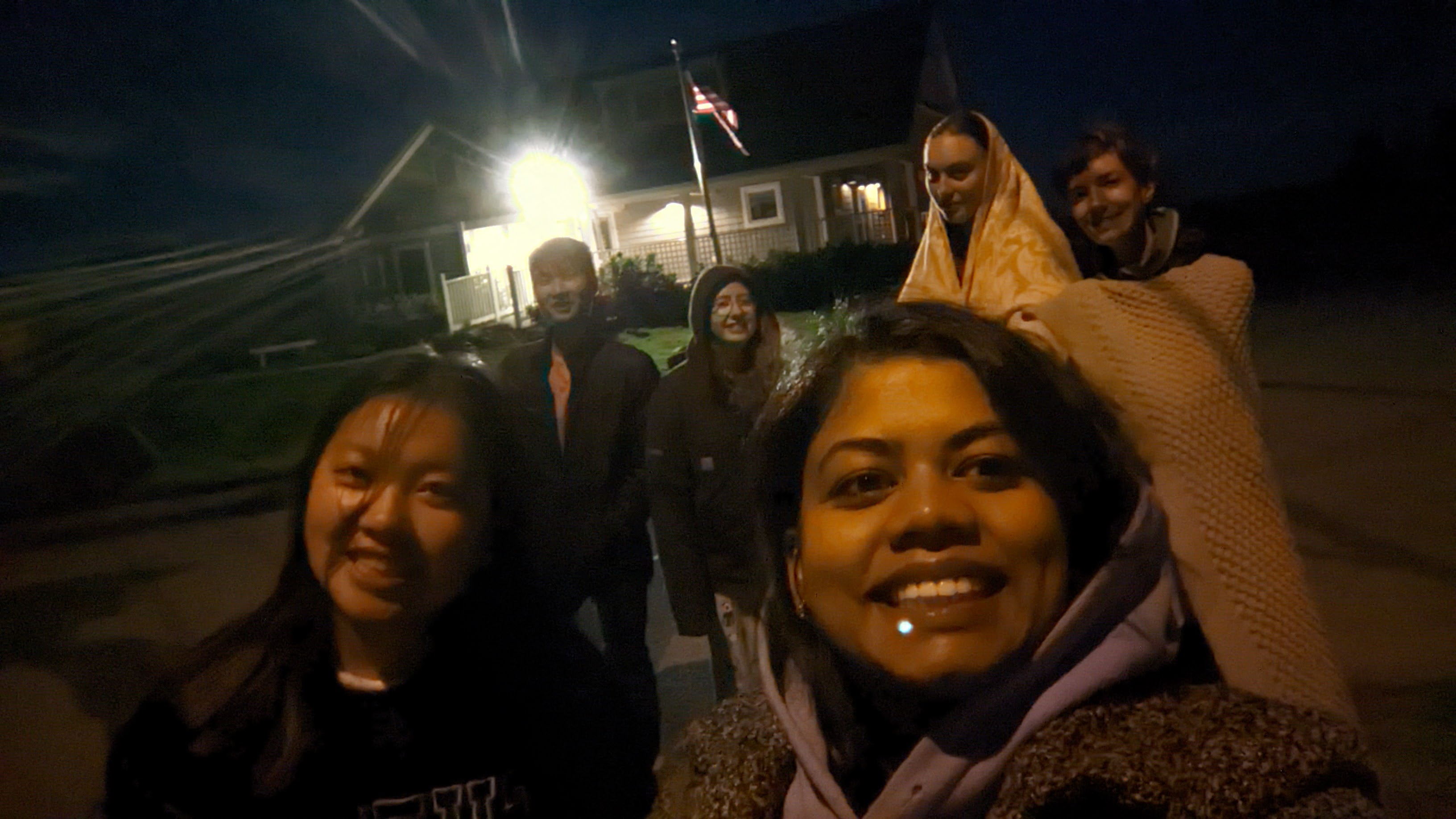 Thanks to Austin and Nick for looking over my post.
Thanks to Austin and Nick for looking over my post.

Sorry if this is only tangentially relevant, but I honestly think more courses, discussion groups, and especially virtual programs could benefit from using the EA Gather Town for their sessions. This doesn't suit everyone, of course, but I think there are a lot of people for whom it would be optimal on the margin. I would be happy to help with this in any way I can.[1] Get in touch if you're interested. : )
Yellow hosted some unofficial intro course cohorts here, and one of them became a regular coworker, and several others have returned to the space every now and then. (Yellow actually invited the students and hosted the courses on their own initiative, and they made a guide! Needless to say, Yellow is pretty awesome.)
One-off events that people travel to are really great for inspiration, learning seriously, and strong connections. But there are significant obstacles to keeping up those connections after people return home to their daily routines. The environments (locale, incentives, activities) where they made the connections are often very different from their habitual environments where they'd have to find a way to maintain the connections. If they live far apart, they might not be the kind of people who have much bandwidth for communicating online, so the connection fades despite wanting to keep in touch.
For fostering long-term high-communication connections between EAs, I suspect local or online activities are underexplored. Events that are more specifically optimised for kickstarting a perpetual social activity (e.g. coworking, or regular meetups in a place they can always return to) for those who want it seem more likely to enable people to keep in touch, and EA Gather is great for that. Probably locally hosted activities work too, but I don't know much about them.
Either me or any of the other stewards could give quick intro tours to newcomers on e.g. how to connect with others via the space, community norms, benefits of coworking, etc. We could also build out or customise the space for what people want to use it for, but we have plenty of space so we might already have what you need for what you want to do.
I think there is a lot to learn from this piece and I'm glad you posted it :) I like the idea of bringing EA professionals to speak and for AMAs, especially afterward, to help people realize just how deep they can go. I like the idea of using the venue well to have 2 concurrent workshops or what have you in different rooms, who can mingle during meals and off-hours. It also sounds like you got all the informational stuff out of the way on the first day and thats great, leaving the second for more hands-on stuff. I am also very happy that people didn't have to read intro materials beforehand.
It does seem really time intensive for organizers though. And money intensive. Have any groups just tried doing daylong things, with no sleepovers/retreat aspect? It would mean renting a much cheaper airbnb for the weekend, with only 2-4 bedrooms (for organizers), but with really nice common areas for everyone during the day, well-located near walking areas and central enough people can drive or uber to twice without a big issue? For students you could offer to subsidize ubers. You can provide snacks, lunch, and dinner. Maybe you do lunch as something simple that can be made in an instapot or the oven (burritos, burgers, vegan chicken tenders), and cater dinner.
I imagine 2 full saturdays is doable for a lot of people and we have gotten good feedback that people (professionals) would attend a 2 day condensed in-person program. But we havent done an intro course over 2 days yet. Right now we are doing 4 week condensed thing, but we plan to try 2 day as well.
“There are also strong selection effects on retreat attendees vs. intro fellows”
I wonder what these selection effects are. I imagine you get a higher proportion of people who think they are very excited about EA. But also, many of the wicked smart, high achieving people I know are quite busy and don’t think they have time for a retreat like this, so I wonder if you’re somewhat selecting against these people?
Similarly, people who are very thoughtful about opportunity costs and how they spend their time might feel like a commitment like this is too big given that they don’t know much about EA yet and don’t know how much they agree/want to be involved.
Do you have a source for this? Thank you!
This is just based on what Stanford/Harvard organizers have said to me. It depends who you ask and how they define retention but 10% is the number I hear thrown around the most.
Thanks Rachel. If anyone else reading this has any more data on this point I'd be very interested. I'm helping with the first EA for Jews intro fellowship and we're thinking about how to assess its impact. If 90-98% of people who do an intro fellowship never engage with EA again afterwards that seems quite strong grounds for rethinking whether we (as a community) should invest in intro fellowships as much as we seem to. And/or if we should experiment much more on different types of intros to see if there is greater impact.